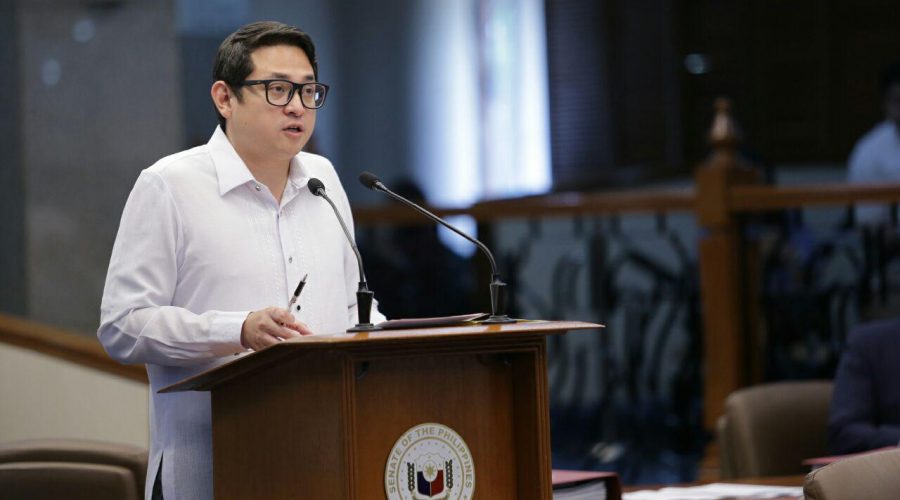Pagkaing Pinoy Para sa Batang Pinoy Act
Sponsorship Speech: Pagkaing Pinoy para sa Batang Pinoy Act
Senator Paolo Benigno “Bam” A. Aquino IV
17th Congress, Senate of the Philippines
Sponsorship Speech as delivered, December 13, 2016
Magandang hapon po sa ating lahat! Mr. President and my distinguished colleagues, good afternoon!
I stand before you today as the Chairman of the Senate Committee on Education to sponsor Senate Bill No.1279 in substitution of Senate Bill Numbers 23, 123, 160, 220, 406, 416, and 694, Under Committee Report No. 21 entitled: An Act Creating a National School Feeding Program to Combat Hunger and Undernutrition for All Public Basic Education Students, and For Other Purposes, otherwise known as the “Pagkaing Pinoy Para Sa Batang Pinoy Act”.
Mr. President, yesterday, we lost an exemplary Filipino and a true advocate for prosperity – Mr. Manny Perlas of Lifebank – that’s him right there with the white hair. Manny Perlas was one of the first benefactors of GK’s Kusina ng Kalinga and the group credits his leadership in the establishment of this feeding program back in 2014.
Mr. President, this is a photo of Mr. Manny Perlas during the opening of the first ever Kusina ng Kalinga in Alang-Alang Leyte. Manny’s Kusina ng Kalinga or KnK has always been a program that brings smiles to people’s faces – whether students, teachers or volunteers!
Mr. President, nagsimula po ang KnK sa Leyte bilang relief effort para sa public school na apektado ng Typhoon Yolanda – ang Alang-Alang I Central School, kung saan po itinayo ang unang kusina.
Mr. President, nalaman po nila na ang numero-unong dahilan kung bakit hindi pumapasok ang isang mag-aaral ay dahil sa gutom – gutom na madali namang pawiin sa simpleng feeding program. Noong nakita nila na dahil sa KnK ay mas masigla at mas bibo sa klase ang mga estudyante, itinuloy po nila ang proyekto!
Kumuha ang KnK ng tatlong regular na kitchen staff at nakakakuha rin sila ng sampu hanggang labinlimang volunteer na magulang sa bawat araw ng pagpasok. Kinausap ho nila ang mga lokal na magsasaka upang mag-supply ng mga ingredients, tulad ng malunggay.
And Mr. President, thanks to Kusina ng Kalinga in Alang-Alang, Leyte, thanks to parent volunteers, and thanks to local farmers, about 2,600 students are fed nutritious meals in 4 schools (in Leyte) – Alang-Alang I Central School, Binongtoan Elementary School, M Casaus Elementary School, and San Roque Day Care Center.
Based on their data, the number of severely malnourished children in their schools dropped from 268 to 47, that’s 11% down to 2%, spanning one school year, 2015 to 2016 (Start of Year Report vs. End of Year Report, SY 2015-2016).
Since they started the project in Leyte in 2014, Kusina ng Kalinga now covers 61 schools and feeds over 18,000 Filipino children around the country. And, Mr. President, I’m happy to learn that Kusina ng Kalinga is not the only successful feeding program in the country.
There are smaller movements like our friends from Navotas High School with a current program that feeds 120 students. Advancement for Rural Kids or ARK also has a feeding and livelihood program that has helped 10 communities and over 2,400 kids. There are also larger movements like Jollibee Foundation’s Busog, Lusog, Talino School Feeding Program that has covered 1,500 schools, feeding over 140,000 students from 2007 to 2014. And Mr. President, there are even more feeding programs around the Philippines!
But unfortunately, all of these efforts are still not enough. In The State of Food Insecurity in the World 2012 study conducted by the Food and Agriculture Organization or FAO, it was revealed that 16 million Filipino children are considered undernourished. Mr. President, labing-anim na milyong batang Pilipino ang undernourished. Iyan po ay isang numero na napakalaki at nakakabahala.
Sa kabilang dako naman po, ang ating mga mangingisda at magsasaka ay patanda ng patanda at pabawas ng pabawas. The average age of the 11 million Filipino farmers and fishermen is 57 years old and the average annual income of a farmer is only 20,000 pesos.
In fact, if you look at these 3 sectors – our fishermen, farmers, and children – you will find that these sectors have the highest poverty incidence. For fishermen it is at 39.2%, for farmers it is 38.3% and 35.2% for children, according to the Philippine Statistics Office. All of this is in 2012, Mr. President.
Kailangan nating gawan ng paraan na matulungan ang mga batang Pilipinong nahihirapang mag-aral dahil sa kumukulong tiyan. Kailangan rin po natin bigyan ng sapat, regular, at pangmatagalang kabuhayan ang ating mga magsasaka at mangingisda.
Mr. President and honored colleagues, aren’t these two problems pieces of the same puzzle that fit perfectly together?
On one hand, we have children who need nutritious food and on the hand we have farmers and fishermen producing food without the means to sell. Today, we’re given the opportunity to bridge this gap and fulfill our duty to uplift the lives of our poorest countrymen. The Pagkaing Pinoy Para sa Batang Pinoy Act can be that link between hungry young Filipinos and anxious farmers and fishermen.
The Pagkaing Pinoy Para sa Batang Pinoy Act will bring the progress we’ve seen in Alang-Alang, Leyte of Kusina ng Kalinga to more and more students and more and more communities across the country. The Pagkaing Pinoy Para sa Batang Pinoy Act will institutionalize an effective feeding program, sustained by local gardens, farmers and fishermen, and powered by community engagement and volunteerism.
Through this policy, school children in the kindergarten and elementary levels will enjoy free access to nutritious food with the DepEd ensuring that students from kindergarten to grade 6 are provided with proper meals.
In addition, this measure includes a Gulayan sa Paaralan program to promote gardening in schools and households, which will help augment the food needs of the program and instill a sense of appreciation for food production within the community. Sa programang Gulayan sa Paaralan, matututunan po ng mga mag-aaral na pangalagahan ang pagtatanim ng pagkain at ng pagsasaka. The goal of this measure is not just to feed our hungry Filipino children but to nourish them with healthy food sourced from the community, sourced local farmers, and fishermen.
Mr. President, when our students are healthy and fed, they grow even hungrier for knowledge and learning! Thanks to the nutritious meals, they joyfully go to school and gladly participate in the classroom.
Sa Pagkaing Pinoy para sa Batang Pinoy Act, lalaki ng malakas, matalino at malusog ang kabataang Pilipino habang umaasenso naman po ang buhay ng ating mga magsasaka at mangingisda!
Suportahan po natin ang pagpasa ng Pagkaing Pinoy Para Pa Batang Pinoy Act para sa kabataang Pilipino, para sa ating mga mangingisda at magsasakam para sa ating komunidad, at para sa ating bayan! Maraming, maraming salamat po!
Aquino, Poe push for approval of feeding program in public schools
A senator urged colleagues to hasten passage of the proposal seeking to address hunger of students in public schools and provide additional livelihood for farmers and fisherfolk.
Sen. Bam Aquino made the call during his sponsorship speech for Senate Bill No. 1279 or the Pagkaing Pinoy Para sa Batang Pinoy Act, that institutionalizes an effective feeding program for students of basic education.
Being a staunch advocate of addressing hunger, Sen. Grace Poe co-sponsored the measure.
According to Sen. Bam, chairman of the Committee on Education, these feeding programs will be sustained by local gardens, farmers and fishermen, and powered by community engagement and volunteerism.
“Through this policy, infants and school children in the basic education will enjoy free regular access to nutritious food,” said Sen. Bam, author of Senate Bill No. 694, which was consolidated in Senate Bill No. 1279 together with Senate Bill Nos. 23, 123, 160 and 548.
If enacted into law, Sen. Bam said Department of Education will be mandated to ensure that students from basic education are provided with proper meals.
“Through this policy, school children in the basic education will enjoy free regular access to nutritious food with the Department of Education ensuring that students are provided with proper meals,” he said.
The proposal will utilize locally sourced and locally produced food products to support local farmers and fishermen, providing them with regular income and livelihood.
“Sa Pagkaing Pinoy para sa Batang Pinoy Act, lalaki nang malakas, matalino at malusog ang kabataang Pilipino habang umaasenso ang buhay ng ating mga magsasaka at mangingisda,” said Sen. Bam.
Based on 2012 data from the Food and Agriculture Organization (FAO), 16 million Filipino children are considered undernourished.
Studies also show that the average age of the 11 million Filipino farmers and fishermen is 57 years old while the average annual income of a farmer is only about 20,000 pesos.
“The Pagkaing Pinoy Para sa Batang Pinoy Act can be that link between hungry young Filipinos and anxious farmers and fishermen,” said Sen. Bam.
The measure also pushes for the “Gulayan sa Paaralan” program to promote gardening in schools and households, which will help augment the food needs of the program and instill a sense of appreciation for food production within the community.
After sponsoring the measure, Sen. Poe thanked Sen. Bam for his speedy action on the bill and several other senators also lauded his efforts. In turn, Sen. Bam thanked his colleagues for their support behind the enactment of the measure into law.
“With the full support of fellow lawmakers, we can definitely pass this measure quickly and, finally, feed our poor and hungry students across the country,” said Sen. Bam.


Recent Comments